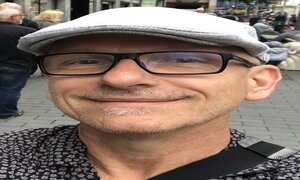Can travel be sustainable?

Can travel be sustainable?
As mountain sports enthusiasts we generally consider ourselves to be nature lovers, outdoor advocates, even environmental activists. But some of us also lead active lifestyles and like to be on the move or traveling a lot. So can travel and sustainability go hand in hand? And if so, how?
That's exactly what we asked travel expert and founder of "REISEN MIT SINNEN" (Travel with Feeling) Kai Pardon.
Kai you set up “REISEN MIT SINNEN”, a sustainable travel company that offers climate-neutral travel solutions. It sounds like the perfect way to balance climate protection, on the one hand, with wanderlust on the other. What's the secret?
Climate-neutral travel is sadly not a realistic option at this stage. And the reason for that is primarily how you get there, especially if it's by air. There is also a big lack of climate neutral hotels. And when it comes to food, it's impossible to sustain climate-neutral eating habits, in particular if you're having to eat lots of meat. So that's why we bolster our efforts with the help of carbon offsetting.
When it comes to offsetting CO2 emissions, we are told that we can make anything from bus travel to pizza deliveries and clothing climate neutral. It sometimes feels like it's a way of atoning for our ecological 'sins'. Is that really the solution?
Offsetting is the only way to reduce your carbon footprint. atmosfair is the best provider when it comes to offsetting, and the one we use for offsetting at REISEN MIT SINNEN. We offset 100% of emissions from all flights and ground operations. We are truly industry leading in this respect. In terms of climate protection, where possible, avoiding CO₂ emissions altogether is always the best approach, and preferable to other measures. But where CO₂ emissions cannot be avoided, then it’s important to take steps to reduce those emissions as much as possible. atmosfair offsets any unavoidable emissions through CDM Gold Standard approved climate action projects. While we still lack clean fuel solutions it’s the only effective way to mitigate global climate change. In 2021, atmosfair opened the first e-kerosene plant. E-kerosene is carbon-neutral, renewable jet fuel, and so not harmful to the planet. It’s a first step at least.
But the actual emissions generated by a flight are not reduced if you offset your CO2 emissions. Are there other ways to achieve climate neutral air travel?
I hope that clean air travel will one day be universally available. E-kerosene or hydrogen-powered air travel is still only an option for the future. So when will we reap the rewards? Experts predict that it will be at least 10 years before there is any tangible progress here.
Conventional fuel made from carbon and hydrogen combusts inside an engine and emits water vapor and CO₂ (carbon dioxide) which is damaging to the climate. But if you take away the carbon and only use hydrogen, then no CO₂ is generated during combustion. Hydrogen can also generate electricity in fuel cells and can therefore be used to power electric motors. The electric power generated could work together with other power sources to make an aircraft climate friendly.
"Real sustainability means cutting out travel altogether." You must have heard or read comments along those lines. What would your response be?
Yes, essentially that’s right. But…
Many countries rely on tourism for jobs and income. We mustn’t underestimate the societal aspect of travel. Responsible travel operators like ourselves, place great importance on social sustainability. This includes fair wages and using hotels and restaurants that are locally owned. Were tourism to cease completely because of the harmful nature of air travel, we would see many tourist destinations get into extreme difficulties.
Our kind of travel certainly gives the destinations we visit much more than cruise ships or all -inclusive packages. Some of these leave nothing behind in the destinations they visit.

We have a few ground rules we abide by: The further you fly, the longer your stay should be. Try to avoid some flights altogether. I would include short-haul flights anywhere in the world here. A weekend shopping trip to New York or Dubai is also not in keeping with sustainable travel. For shorter travel distances, why not look for destinations that are near to a train station?
When traveling independently, what steps can one take for greener travel? Is it more sustainable to travel alone or to join group or tour?
For many people it’s become easier to build sustainability into their everyday lives. We can avoid single-use plastics, we can buy locally produced food and choose to leave the car at home and cycle to work instead. There are lots of everyday things we can do to make the world a little bit better. And when it comes to sustainable travel, only fly when there is no other option and stay in your destination for a proportionally lengthy period of time compared to the distance you’ve traveled. And using public transport while you’re there is of course greener than driving a rental car, say, but it’s more difficult because it means you won’t always be able to get to the places you want to visit by public transport alone – in particular some of the nature attractions.
Tourist traps can be inescapable when traveling and are seldom underpinned by social responsibility. What tips do you have for making sure that the money you spend in faraway places actually ends up in the hands of the local population?
Be sure to book owner-operated, smaller accommodations or eco establishments. Frequent the local restaurant scene and try out the traditional dishes from that area. That way, more people will benefit from your trip, improving overall quality of life in a more equitable and widespread way. With us, for example, a minimum of 50% of the tour price always remains in-country.

For an increasing number of people, special places like Antarctica are on alluring once-in-a-lifetime destination. Tourism to the world's most remote places continues to grow. However, as seen in Antarctica, for instance, it is leading to some serious environmental issues. Is there anywhere one should not go or that you think will end up inaccessible to tourism in the future?
Like you say, Antarctica is definitely one of the places you should avoid if sustainability is important to you. The same goes for the Galapagos Islands. As much as I understand the attraction of wanting to see and experience these special environments and of course the wildlife in such extreme places with your own eyes, I think the ecosystems are too fragile to withstand the influence of tourism in the long run. I can also see such places being closed off to any kind of tourism in the future, to preserve the flora and fauna there, as is already the case in some nature reserves. For some of these places, like those mentioned above, the question will probably - unfortunately - resolve itself over the coming decades, because as a result of the climate crisis they will simply no longer exist.
On the other hand, sustainable tourism can also help to save some species. We support a gorilla project in Uganda. By allowing small groups of tourists to visit the wild gorillas in their natural habitat together with rangers, it means the rainforest won't undergo any further clearing and the gorillas won't be hunted. There are some instances where species conservation can benefit from tourism.
Responsible travel also means traveling slowly and taking time to get to know places. With just one week's vacation, a lot of working people can't really consider taking it slow. Why should you still try to schedule more time for travel if it's just to watch the rice grow in Laos?
There are several reasons for this. The first is environmental: as a sustainable tour operator, we never offer trips where the CO₂ emissions for the flight are disproportionate to the length of stay. For a long haul trip, you should factor in at least two weeks to justify your footprint to some extent.
On the other hand, you have to ask yourself, what's the point of immersing yourself in a foreign culture for just one week? What will I really learn about another country in such a short time? You're just scratching the surface. After all, a deeper understanding only happens when you engage with the people and their lives. Those kinds of experiences don't just happen overnight. If, for example, I was to embark on a week-long must-see tourism schedule in Laos, as you mentioned, it would end up being stressful, and nothing like a relaxing vacation. Better in that case to travel less often, but for longer. If you can really only take one week off work, then I'd say it would be better spent in your home country, like Germany, or neighboring countries. There are some fantastic places to visit, where you can really relax and switch off. Hiking, for example, is absolutely meditative for me. I can really clear my head. Or instead of watching the rice grow in the paddy fields, what about watching mushrooms grow - and then later making a wonderful meal using them, accompanied by a delicious wine from the region... that's what unwinding feels like to me.

Responsible travel can really broaden one's horizons. What have you learnt about sustainability from traveling to various countries? How do other cultures approach sustainability?
In lots of countries, sustainability as we know it, doesn't really feature yet. In particular in poorer countries, it simply isn't mentioned. But of course, there are also pioneers wherever you go, establishing sustainability projects. Be it building eco-accommodation or setting up social or environmental projects like tree planting or species conservation.